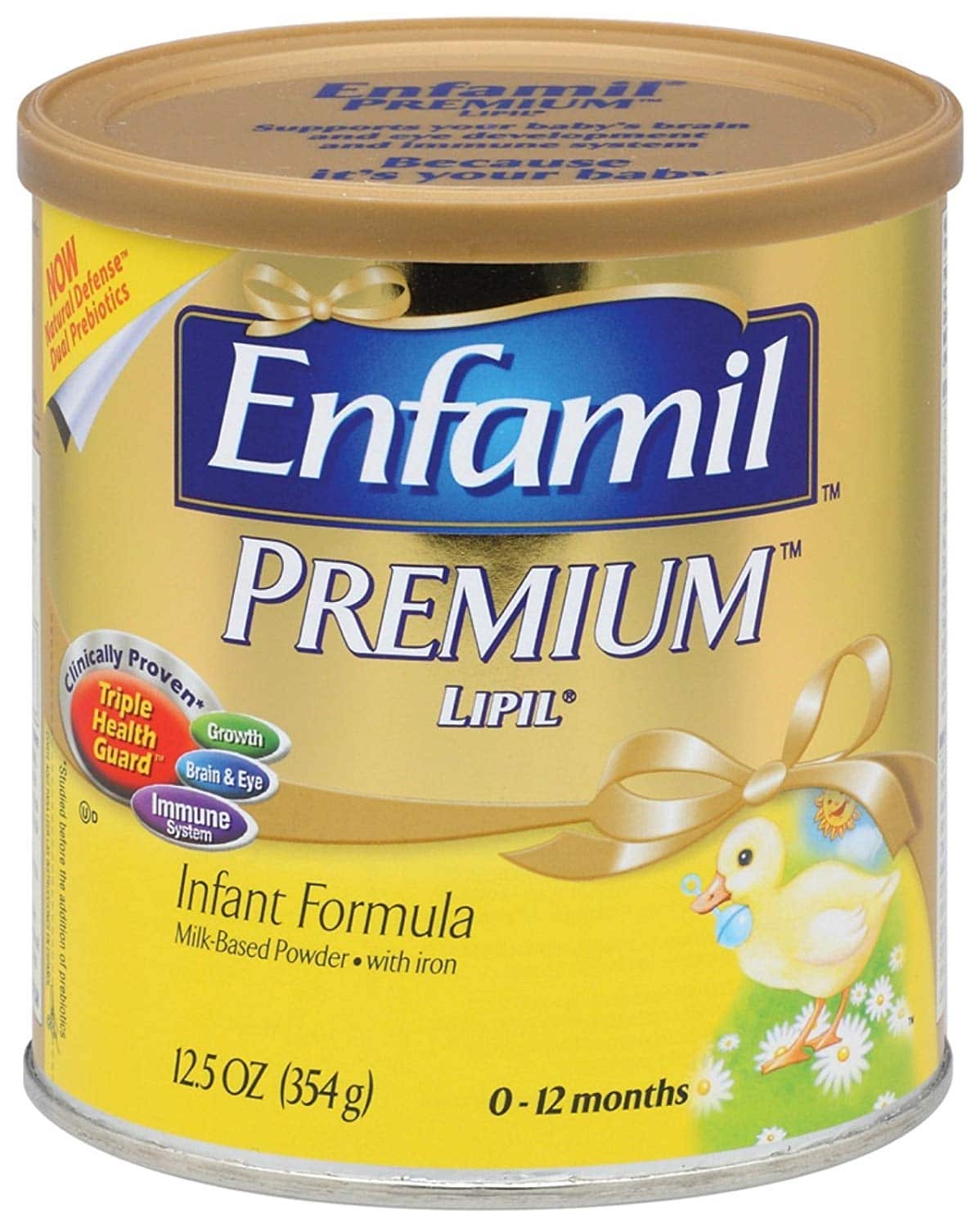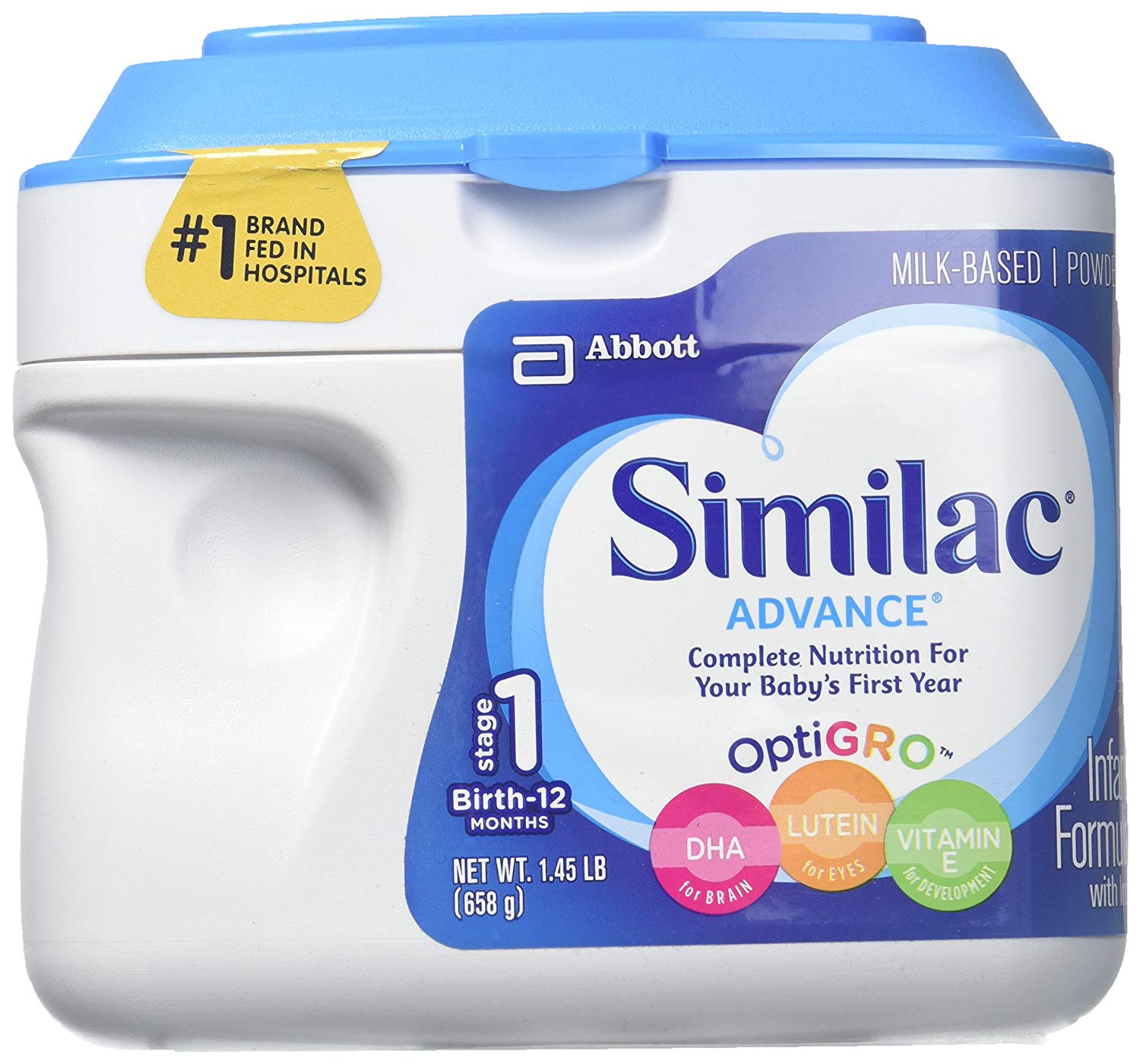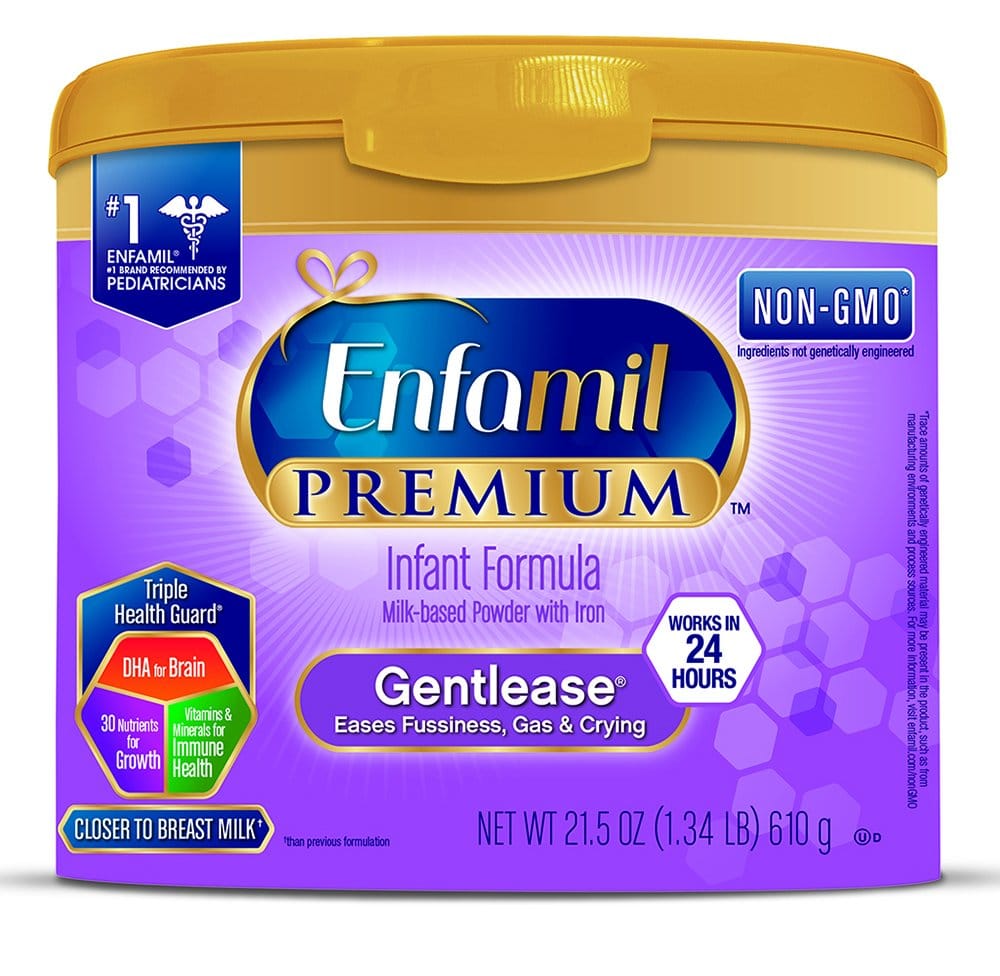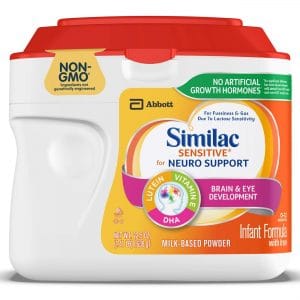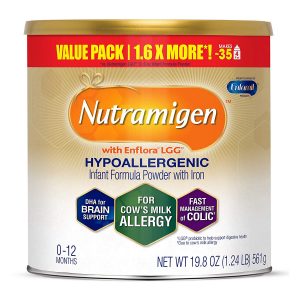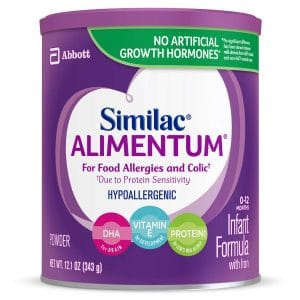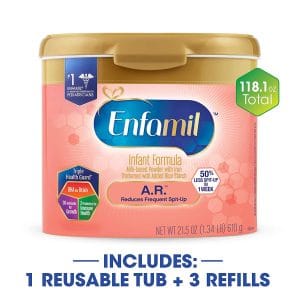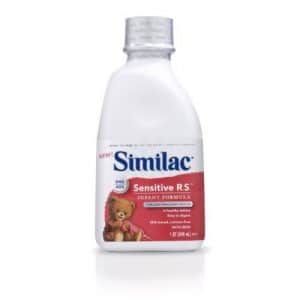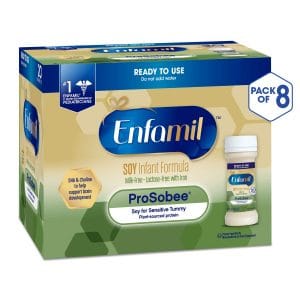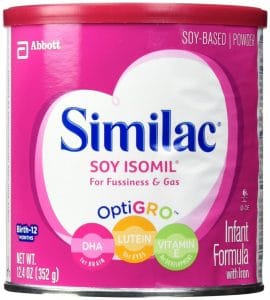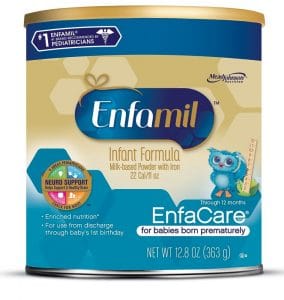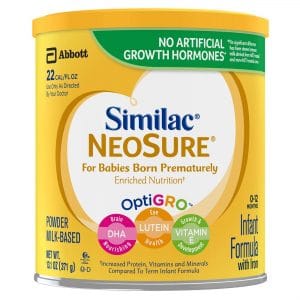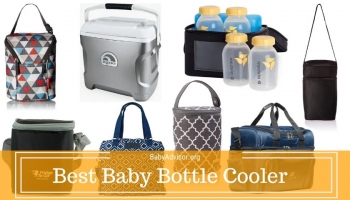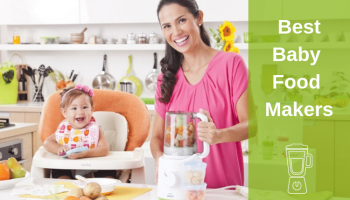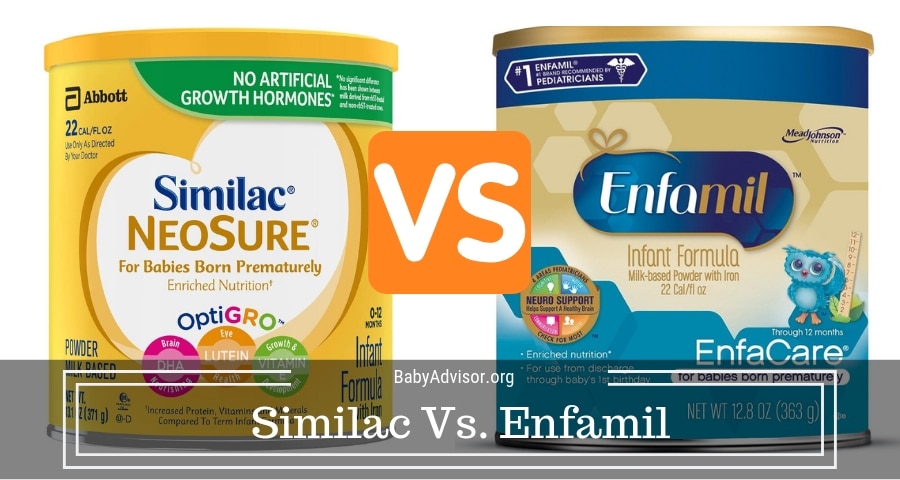
Picking the right formula for your baby can be difficult. Some babies handle certain brands better than others, and it can be a lot of trial and error to pick the right one. Two leading brands of formula are Similac and Enfamil, and you might find yourself comparing Similac vs. Enfamil in the formula aisle at Walmart. Is one better than the other?
Your baby can’t tell you what he needs or wants, but you do want to take some time to study these two popular brands. While they do offer comparative formulas, Enfamil and Similac aren’t the same.
Now, before we get too far, remember that all infant and toddler formulas sold in the United States have to meet the minimum nutritional requirements according to the standards set by the Food, Drug, and Cosmetic Act and FDA regulations. No, that doesn’t mean all of the formula brands are the same. Instead, it means that you can pick to use a brand name formula, such as Similac, or a store brand formula, such as Parent’s Choice. They all have to meet the same minimum nutritional needs for infants.
A Quick Look at Enfamil
Enfamil is one of the top-selling formula companies in the United States, and they boast a highly advanced center with experts to help them develop their infant formula products. Their goal is to create formulas with the correct amount of vitamins and nutrients required for that particular age group. Your child will experience healthy growth and development of a robust immune system.
Enfamil is one of the few formulas that crafted one just for newborns. Their Enfamil Newborn is meant for babies below the age of three months of age. It contains 400 IU of vitamins that are recommended for newborns by the American Academy of Pediatrics. Enfamil also fortified their Newborn formula with DHA and ARA because it’s found in breast milk.
A Quick Look at Similac
Similac categorizes their formulas based on the different needs of the infant. They rely on expert advice to support healthy babies with the brain and eye development. Most of their formulas contain lutein, DHA, and vitamin E, along with all of the necessary nutrients and vitamins. Lutein plays a vital role in vision development, and DHA is for the development of the brain.
Comparing the Types of Baby Formula
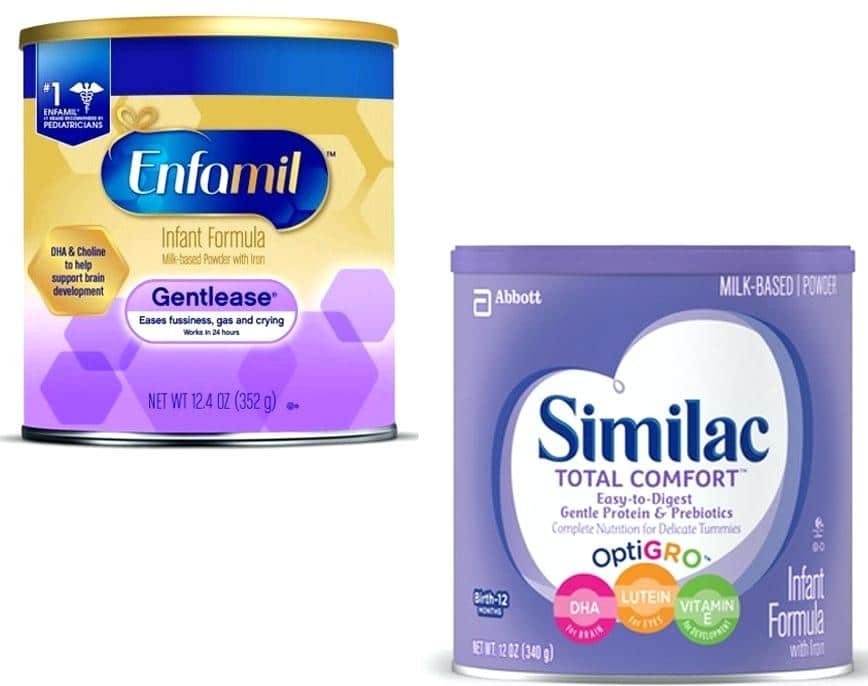
Similac and Enfamil sell different types of baby formula. Let’s take a look at the varieties and the options that both companies offer for babies.
1Cow’s Milk-Based Formula
Cow’s Milk-Based Formula
Cow’s milk-based formulas are the first choice if babies aren’t breastfed. It’s the formula that most babies handle well, and every formula brand sells some cow’s milk-based formula.
Both Enfamil Lipil and Similac Advance are top-selling formulas for these companies, and they have all of the necessary fats and nutrients. Your baby will thrive and grow with this!
| Enfamil Lipil | Similac Advance |
|---|---|
| Enfamil Lipil is a milk-based formula that uses oleic safflower oil, soy oil, and coconut oil as its fats base. It doesn’t contain any added sugars, and Enfamil added DHA, choline, vitamin K, and a prebiotic. | Similac Advance has many similarities to Enfamil. It is a milk-based formula that also relies on oleic safflower oil, coconut oil, and soy oil for its fats. However, it doesn’t use palm olein oil, so many parents believe Similac Advance is better if your baby has tummy issues. |
| Unlike Similac, Enfamil uses palm olein oil because it’s a fat that is more similar to breast milk. However, some parents notice that it’s not as gentle on tummies as Similac. | Similac added lutein for vision health, which Enfamil does not. They also added DHA, choline, vitamin K, and a prebiotic but skipped the added sugars. |
2Gentle Formulas
Gentle Formulas
Some babies struggle to digest typical cow’s milk-based formula, so a gentle formula contains less lactose. This type of formula is excellent for babies who are gassy or fussy on regular formula. Talk to your pediatrician before trying a gentle formula.
Both Similac Sensitive and Enfamil Gentlease are ideal for babies who have gassy or fussiness, but you can also use these for babies who spit-up often.
| Enfamil Gentlease Lipil | Similac Sensitive |
|---|---|
| Enfamil Gentlease is a favorite choice for sensitive babies because it doesn’t contain any added sugars, so many feel as if it’s a better choice. When compared to Similac Sensitive, they have the same amount of proteins, fats, vitamins, carbohydrates, and water. | Similac Sensitive has been around for nearly a decade, and they’ve worked to perfect their formula. It does use corn syrup solids, which some consider being negative, but Similac does offer a non-GMO version. |
| The significant difference between Enfamil Gentlease and Similac Sensitive is that Enfamil uses partially hydrolyzed nonfat milk and whey protein concentrate solids from soy. This combination is ideal for delicate tummies because it’s much easier to digest. | Similac uses a milk protein isolate that is easy to digest for babies with sensitives. However, this isolate is known to trigger allergies. Similac Sensitive does contain more linoleic acid and added sugars. |
3Lactose-Free Formula
Lactose-Free Formula
Is your baby struggling with lactose? The lactose-free formula is needed for a baby who is lactose intolerant. The other choice is to use a hypoallergenic formula for babies who are allergic to cow’s milk. Babies can struggle to digest cow’s milk protein.
If your baby is allergic to cow’s milk, you might want to consider Enfamil Nutramigen or Similac Alimentum. Both are meant for babies who have colicky symptoms when given cow’s milk proteins. It works for babies who have a mild aversion and those who cannot digest the proteins at all.
| Enfamil Nutramigen | Similac Alimentum |
|---|---|
| Enfamil makes a considerable claim when it comes to this formula. They advertise that Nutramigen will help to reduce colic symptoms caused by a cow’s milk allergy in two days. Parents report that this formula does help to minimize colic while giving their baby all the nutrients needed. Nutramigen is considered a hypoallergenic formula. | Similac had to one-up Enfamil by claiming that their formula will reduce colic symptoms in one day while promoting overall health. However, we do have to note that, while the formula is hypoallergenic, it’s not lactose-free because it still contains products from milk. It lacks actual lactose, which is the hardest part to break down for the digestive system. |
| This formula contains casein hydrolysate, which is smaller and more comfortable to digest protein made from cow’s milk. They added sugars, to make it easier to digest, but Enfamil uses corn syrup which some parents dislike. | Similac uses casein hydrolysate because its a smaller, easier to digest protein. Instead of corn syrup, Similac uses corn maltodextrin as its added sugar to help with digestion. |
| Unlike Similac, Enfamil uses modified corn starch to thicken up the formula, so it’s easier for babies to digest. However, some babies struggle with constipation when facing a thickened formula. | One difference between Enfamil and Similac Sensitive is that Similac has higher amounts of linoleic which is a fatty acid. |
4Added Rice Starch Formula
Added Rice Starch Formula
It’s no longer advised for parents to add rice cereal to a baby’s bottle because it can cause the child to choke. Instead, if your baby is struggling with acid reflux, your pediatrician might recommend a formula with added rice starch to thicken the liquid. Using a thickened formula means that it doesn’t come back up as easy, reducing spit-up and helping your baby gain weight appropriately.
Both companies offer an added rice starch formula. The two options are Enfamil A.R. and Similac Sensitive R.S, and both are for babies who spit-up more regularly than an average baby.
| Enfamil A.R. Lipil | Similac Sensitive R.S. |
|---|---|
| Enfamil claims that their A.R. baby formula can help to reduce baby spit-up by over 50%, and many parents say that these claims are valid. The reduced spit-up might be because not only does this formula contained rice starch, but it also has two prebiotics that helps with digestive health. | On the other hand, if you think milk products cause your baby to spit-up more, Similac Sensitive might be a better choice because it doesn’t have as many milk proteins. Instead, it does use more sugars, which helps it taste better and to decrease fussiness. |
| One difference between Enfamil and Similac is that Enfamil’s first ingredients are nonfat milk, vegetable oils, rice starch, lactose, and maltodextrin. Plus, Enfamil adds two prebiotics to ease digestion problems. | When we compare ingredients, Similac’s first ingredients for this formula are corn syrup, modified rice starch, milk protein isolate, vegetable oils, and one prebiotic. |
Both of these formulas contain sugar to help decrease as well as rice starch to thicken the formula.
5Soy Formula
Soy Formula
Some babies have galactosemia, lactose intolerance, or a milk protein allergy. If your baby fits in one of those categories, soy formula may be the easiest for your child to digest. Soy formula has grown in popularity over the past years.
Both Enfamil and Similac crafted formulas that are great for colicky babies who struggle to digest lactose. Also, some vegan families opt for soy formulas immediately to avoid using animal-based products. Some families do prefer Enfamil because it uses fewer sugars, and some infants struggle to digest sugars. However, that does affect the taste, so if your baby refuses to take Prosobee, try Similac Isomil because it does have a better taste.
| Enfamil Prosobee Lipil | Similac Isomil Advance |
|---|---|
| Both Enfamil and Similac have similar ingredients. They both start with corn syrup as the first ingredient and use soy protein isolate. Soy protein isolate means that they’re avoiding all cow’s milk-based proteins. | We know that Similac and Enfamil have close to the same ingredients, so what are the differences? |
| These formulas are pretty close to each other, but one difference to note is that Enfamil uses soy protein as the third ingredient. | Instead of having soy protein as the third ingredient, Similac uses soy protein as the second ingredient. Also, Similac uses more added sugars along with a high linoleic acid amount. |
6Premature Baby Formula
Premature Baby Formula
Premature babies have different calories needs, and they also require additional nutrients when compared to full-term babies. Low birth-weight babies also fall into this category, so speak to your pediatrician about the appropriate formula to encourage faster growth for your baby if his health is a concern.
Enfamil EnfaCare and Similac Neosure provide the nutrient boost for a premature baby, and they’re two of the most popular choices. While they’re both popular, they do have some key differences, so let’s take a look.
| Enfamil EnfaCare Lipil | Similac Neosure |
|---|---|
| Enfamil EnfaCare differs from Neosure because it has 40% more protein than the regular Enfamil formula. It’s added because it’s one of the key ingredients to build new cells and maintain proper growth. | Unlike Enfamil, Similac Neosure contains more soy as well as a higher amount of protein that their average formula. However, just because it has soy doesn’t mean it’s not milk-based. Neosure does tend to be better for sensitive tummies. |
| EnfaCare includes all the antioxidants needed as well as added DHA and ARA. | Just like EnfaCare, Neosure has added DHA and ARA, but Similac used OptiGRO which includes DHA, ARA, and several nucleotides that help the immune system. |
You may also interested to know about the Best Organic Baby Formulas for your baby.
Understanding the Differences in Baby Formulas
So, if all of the baby formulas on the market have to meet set standards, how do these formulas differ?
When you start to compare formula brands, you’ll notice small differences. For example, one brand might contain probiotics while the other does not. Some might use a different source of fats, such as soy or coconut oil, rather than palm olein oil.
A few differences and additions in baby formulas you might notice include:
- Organic Ingredients
- Added DHA and ARA
- Prebiotics
- Probiotics
- Antioxidants
Look at the Nutrients

When comparing Similac vs. Enfamil, you have to look at how the two brands compare when it comes to their primary nutrients as well as vitamins and minerals. We need to compare the calories, fats, proteins and more to get a clear picture.
Calories, Fats, Carbs, and Proteins – Oh My!
These four nutrients are the major players when it comes to baby formula. They matter the most when it comes to your baby’s growth, so considering how Similac and Enfamil stack up in these areas is essential.
To make the comparison, we are going to look at just two formulas for now – Similac Advance and Enfamil Infant. These are their two biggest sellers.
| Similac Advance | Enfamil Infant |
|---|---|
| 20 calories per ounce | 20 calories per ounce |
| 10.7 grams of carbs per 100 calories | 11.2 grams of carbs per 100 calories |
| 2.1 grams of protein per 100 calories | 2.1 grams of protein per 100 calories |
| 5.6 grams of fat per 100 calories | 5.3 grams of fat per 100 calories |
Don’t Forget the Vitamins and Minerals
The vitamins and minerals in the formula you select are essential as well. Both formulas companies have differences and similarities. For example, both Enfamil and Similac use the same amount of vitamin A, and that’s needed for the growth and development of your baby.
Both formulas also use the same amount of iron and calcium. Iron is necessary for cognitive and psychomotor development, and calcium is needed for the development of bones.
For this comparison, we are just looking at the differences.
| Enfamil | Similac |
|---|---|
Higher Levels of:
|
Higher Levels of:
|
| Better Source of Copper | Contains More:
|
Let’s also find out the diffrences between Enfamil Newborn Formula vs. Enfamil Infant Formula.
Which Formula Brand is Better?
Enfamil tends to score better with parents than Similac, but it’s higher price tag pushes more parents towards Similac. Neither brand is worse than other, but Similac’s frequent addition of extra sugars and fewer formulas with prebiotics and probiotics make it a less popular pick.
What formula brand does your baby prefer? Let us know in the comments!

